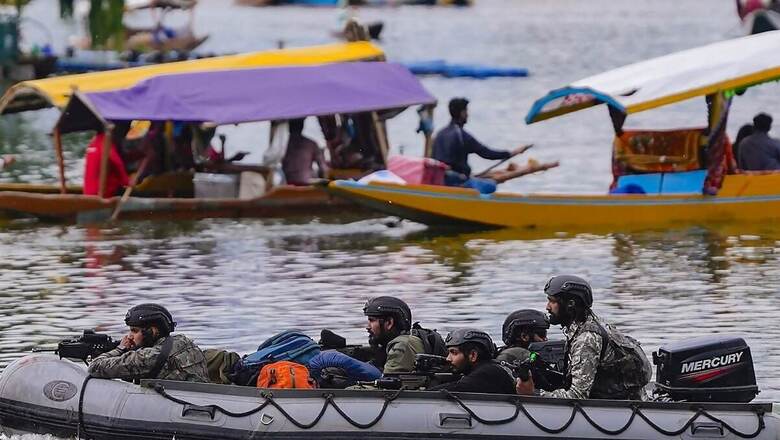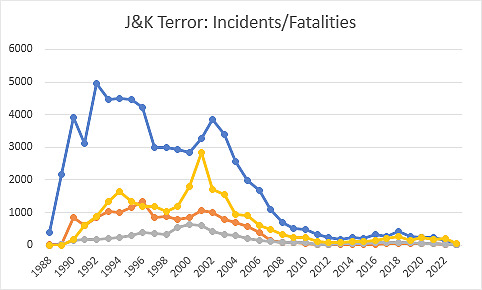
views
An armed separatist movement by the Jammu Kashmir Liberation Front sparked a phase of insurgency in the erstwhile state in July 1988. The immediate impact: massacres and the exodus of Kashmiri Pandits from the Valley, and thousands of civilian deaths each year in the next wave of violence.
According to data obtained from the ministry of home affairs and terror data website South Asia Terrorism Portal (SATP), from 1988 to 2000, there were 44,000 terror and violent incidents in Jammu and Kashmir resulting in the deaths of 10,000 civilians and over 3,500 security personnel. More than 12,300 terrorists were killed in counter-terror operations.
On average, this translates to 3,400 terror incidents a year, killing 790 civilians and 271 police officers and soldiers. It was clearly a situation akin to a graveyard.
But increased security measures by the central government led to a sharp drop in terror incidents in the next decade, but fatalities were still enormous. From 2001 to 2010, J&K reported an average of 1,954 violent incidents each year, resulting in the deaths of 487 civilians and 229 security personnel. In these 10 years, 9,851 terrorists were killed in counter-terror operations.
The scale of violence and fatalities significantly decreased during this period. Terror incidents saw a drop of 48 percent, while civilian deaths decreased by 43 percent. The security in the Valley was much tighter, leading to fewer security personnel being killed in terror strikes and anti-terror operations – 15 percent reduced fatalities.
The next decade clearly established a security dominion for the Indian forces in the Valley against Pakistan-perpetrated terror networks, with incidents and fatalities reporting a downward spiral from 2011 to 2020. On average, terror incidents decreased by 86 percent and civilian fatalities came down by 94 percent. Compared to the previous decade, less than 75 percent of security personnel were killed.
The increased security situation greatly reduced terror activities and fatalities while consistently weakening the terror network in the Valley, resulting in the elimination of around 24,000 terrorists.

While the security situation had improved, Jammu and Kashmir remained unstable. The situation was under the control of the dominion of India, but tension and possibility of a hostile future situation was not unexpected.
What was the root cause behind this?
The root cause was pro-Pakistan political voices in the Valley. While the political class claimed to be with India, it was always “soft” on Pakistan. Parallel networks of separatist organisations like the JKLF, Hurriyat Conference and Jamaat-e-Islami (JeI) worked as support networks for terrorists.
These outfits faced allegations of being involved in terror financing and pushed for an extensive network of overground workers (OGWs) that provided shelter and logistics to terrorists. Radicalisation, terror recruitment and “anti-India” propaganda were the mainstay of their day-to-day activities.
With an increasing crackdown on the terror network, the Valley witnessed an alternate terror trend in the form of mobocracy. Few, but still in thousands and helped by OGWs, radicalised civilians were part of this.
Starting from the 2008 Amarnath land row agitation in Kashmir, stone pelters slowly became a part of the “anti-India mob culture” in the Valley. In just three years, between 2016 and 2018, the state witnessed over 5,500 violent stone-pelting incidents. If not clamped down on, many had the potential to become future terrorists emerging from mob culture.
Path to peace
The need was to address the root cause, to eliminate the “anti-India” network in the state that colluded with Pakistan in financing, recruiting and sheltering terror activities. On August 5, 2019, Article 370 was abrogated ending the special status of J&K. Separated from Ladakh, it became a union territory directly governed by the Union of India until conditions became favourable to establish a legislative body.
All parties and separatist leaders working for Pakistan were apprehended. Terror financing was effectively crushed and a massive operation was launched to arrest OGWs.
According to a report from the think tank, Observer Research Foundation, over 900 OGWs have been arrested so far. The result: a sharp drop in terror incidents after the abrogation of Article 370. Stone-pelting incidents have also stopped.




















Comments
0 comment